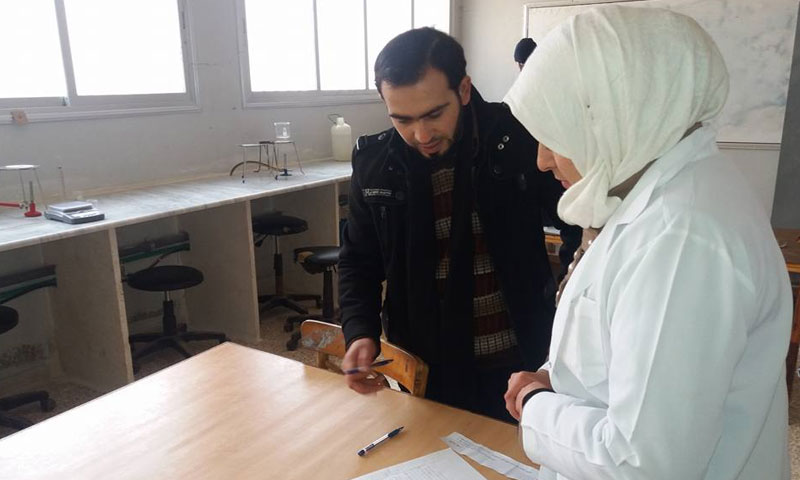



Since it was opened in 2015, the University of Idlib has been seeking to overcome a number of obstacles that were hindering it from receiving an international recognition of the curricula it teaches and graduate students.
The university took the first step in that direction after the Faculty Medicine attained the recognition of the “World Federation for Medical Education,” considered the top international entity specialized in medical education at the level of the world.
According to Ahmad Abu Hajar, the dean of the Faculty of Pharmacy and the Interim dean of the Faculty of Medicine at the University of Idlib, the recognition came as a result of the efforts and coordination between the school of medicine, the presidency of the University of Idlib and the Council of Higher Education, under the “Salvation” government, which lasted for more than two months.
In an interview with Enab Baladi, he pointed out that the classification took a number of criteria into consideration, on top of which are the capabilities of the educational staff, the adopted educational plan and the mass of the laboratories within the faculty, indicating that the Faculty of Medicine at the University of Idlib includes 14 laboratories allocated to students.
These laboratories area divided in the following manner: Descriptive anatomy, physiology, microbiology and microorganisms, medicine, biology and organic chemistry laboratories.
About the importance of the Faculty of Medicine’s entrance to the classifications of the European Union, Abu Hajar said that it erupts from the classification’s being a “wining card” that might qualify the faculty of Medicine at the University of Idlib to be adopted internationally, for international recognition of the faculty starts with getting recognition from the “World Federation for Medical Education,” as he put it.
For his part the Minister of Higher Education under the Syrian “Salvation Government” Jumaa al-Omar said that the recognition of the Faculty of Medicine came after a phase of work and preparations, which required preparing all the official documents of the University of Idlib, its internal system, the University’s license issued by the Council of Higher Education and the translation of the educational, curricula and administrative plans of the Faculty of Medicine, as well as the coordination between the presidency of the University of Idlib and the Council of Higher Education as to reach this result.
In an interview with Enab Baladi, he added that the Faculty of Medicine’s entrance to the classification of the “World Federation for Medical Education” is a vital step, pointing out that many educational entities around the world refuse to host students willing to study medicine if the school from where they have graduated is not enlisted within the World Federation’s record.
“Some of the international medical exams, such as the United States Medical License Examination, condition that the student who would like to apply for the test has to be a graduate of a medical school or faculty that is registered in the records of the World Federation,” he added.
The “World Federation for Medical Education” is the largest international entity, specialized in medical education, resulting from the joint union of the “International Association For Medical Education” (AMEE) and the “Foundation for Advancement of International Medical Education and Research” (FAIMER), educationally affiliated with the World Health Organization.
The World Federation lists only universities licensed by the higher education ministries, councils and entities.
According to al-Omar, Idlib University’s recognition by the Spanish classification of universities has massively contributed in the Faculty of Medicine’s enlistment within the records of the “World Federation for Medical Education,” pointing out that his ministry will work hard to attain an international academic recognition of all the faculties.
The Faculty of Medicine, under the University of Idlib, was opened during the educational year of 2016-2017, a year after the University of Idlib was launched, for classes were available to both first and second students, who shifted to it from other Syrian government universities.
The number of the Faculty of Medicine’s students is about 600 people, who are yet in the first three years of the educational process; the faculty’s staff enjoys high scientific qualifications, as reported by the Dean Abu Hajar.
He pointed out that nine of the staff members are PhD holders, two of them teach medicine, in addition 24 other members who have Master’s Degree and Bachelor of Medicine.
The University of Idlib faces a number of difficulties within the frame of international recognition of its graduate students, in addition to both financial and security-related obstacles. The number of the university students is eighteen thousand, who study in different faculties, scientific and literary.
Despite this, the Minister of Higher Education Jumaa al-Omar said that the University is following the “Domino effect,” by utilizing one success to achieve another.
if you think the article contain wrong information or you have additional details Send Correction